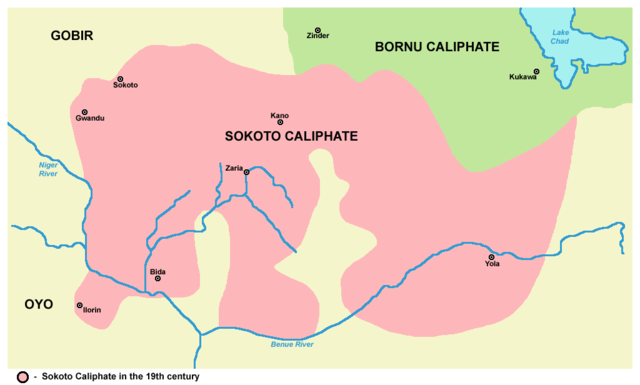Top Qs
Timeline
Chat
Perspective
List of sultans of Sokoto
From Wikipedia, the free encyclopedia
Remove ads
The sultan of Sokoto is the hereditary leader of the Sokoto Caliphate, a Sunni Muslim community in West Africa. The position may also be referred to as the 'Sokoto Caliph' or the "Commander of the Faithful" (Amir-ul-Momineen in Arabic or Lamido Julbe in Fulani). The current holder of this title, since 2006, is Sa'adu Abubakar.[1] The sultan of Sokoto is the leader of the Qadiriyya Sufi order, historically the most important Muslim position in Nigeria and senior to the Emir of Kano, the leader of the Tijaniyya Sufi order.[2] The post has become increasingly ceremonial since British rule defeated the caliphate and replaced it with the Sokoto Sultanate Council in 1903, but the sultan – considered a spiritual leader in the Muslim community in Nigeria – can still carry much weight with Fulani and Hausa people from northern Nigeria.


Usman dan Fodio, the founder of the dynasty of Sokoto State and of the Fulani Empire (consisting of the Fulbe Jihad states of which Sokoto was suzerain), never used the high style of Sultan but was simply titled Amir al-Mu´minin . The first to assume the title of Sultan was Fodio's son Muhammed Bello, who ruled from 1817 to 1837. Since the creation of the title, there have been nineteen Sultans of Sokoto, all men from the Torodbe scholar caste who are descended from Usman dan Fodio. Siddiq Abubakar III was the longest serving Sultan, holding the position for 50 years from 1938 to 1988. The shortest reign was that of Muhammadu Attahiru I, who held the position for five months in 1902–03. The 17th sultan, Ibrahim Dasuki, was forcefully deposed in 1996 by the Sani Abacha military government of Nigeria.[3]
Prior to the beginning of the Fulani Jihad of 1804, the ethnic category Fulani was not important for the Torodbe and their literature reveals the ambivalence they had defining Torodbe-Fulani relationships. They adopted the language of the Fulani and much ethos while maintaining a separate, non-ethnic identity.[4] The Torodbe clan at first recruited members from all levels of Sūdānī society, particularly the poorer people.[5]
Remove ads
List of sultans
Summarize
Perspective
As mentioned above, the sultans were also styled Amir al-Mu´minin and Sarkin Musulmi ("King of the Muslims"), basically the autochthonous form of the former, which is the Arabic style of caliphs and other independent sovereign Muslim rulers that claim legitimacy from a community of Muslims); Mai, occurring in various sultans' surnames, is another autochthonous title.[6] The table below shows the historical list of the sultan of Sokoto, beginning from 1817.
Remove ads
Genealogical tree of the sultans of Sokoto
| Mallam Muhammadu Fodio | |||||||||||||||||||||||||||||||||||||||||||||||||||||||||||||||
| 1 Usman dan Fodio 1804–1815 | Abdullahi dan Fodio Emir of Gwandu | ||||||||||||||||||||||||||||||||||||||||||||||||||||||||||||||
| 2 Muhammed Bello 1817–1837 | 3 Abubakar I Atiku 1837–1842 | 6 Ahmadu Rufai 1867–1873 | Muhammed Buhari Emir of Tambawel | ||||||||||||||||||||||||||||||||||||||||||||||||||||||||||||
| 4 Ali Babba bin Bello 1842–1859 | 7 Aliu Karami 1866–1867 | 8 Abubakar II Atiku na Raba 1873–1877 | 9 Mu'azu Ahmadu 1877–1881 | Umaru Nagwamatse Emir of Kontagora | 5 Ahmadu Atiku 1859–1866 | 11 Abder Rahman Atiku 1891–1902 | Abdullahi Barau Sarkin Yamma | ||||||||||||||||||||||||||||||||||||||||||||||||||||||||
| 10 Umaru bin Ali 1881–1891 | 13 Muhammadu Attahiru II 1903–1915 | 16 Hasan dan Mu'azu Ahmadu 1931–1938 | Usman Shehu | 12 Muhammadu Attahiru I 1902–1903 | 14 Muhammadu Maiturare 1915–1924 | Haliru Ibn Barau Sarkin Yamma | |||||||||||||||||||||||||||||||||||||||||||||||||||||||||
| 17 Siddiq Abubakar III 1938–1988 | 15 Muhammadu Tambari 1924–1931 | 18 Ibrahim Dasuki 1988–1996 | |||||||||||||||||||||||||||||||||||||||||||||||||||||||||||||
| 19 Muhammadu Maccido 1996–2006 | 20 Sa'adu Abubakar 2006– | ||||||||||||||||||||||||||||||||||||||||||||||||||||||||||||||
Remove ads
Gallery
US Secretary John Kerry Visits With Sultan Muhammadu Sa’ad Abubakar Prior To Delivering a Speech in Sokoto
Gate to the Palace of the Sultan
Mosque of Sultan Muhammad Bello
References
Sources and references
See also
Wikiwand - on
Seamless Wikipedia browsing. On steroids.
Remove ads








